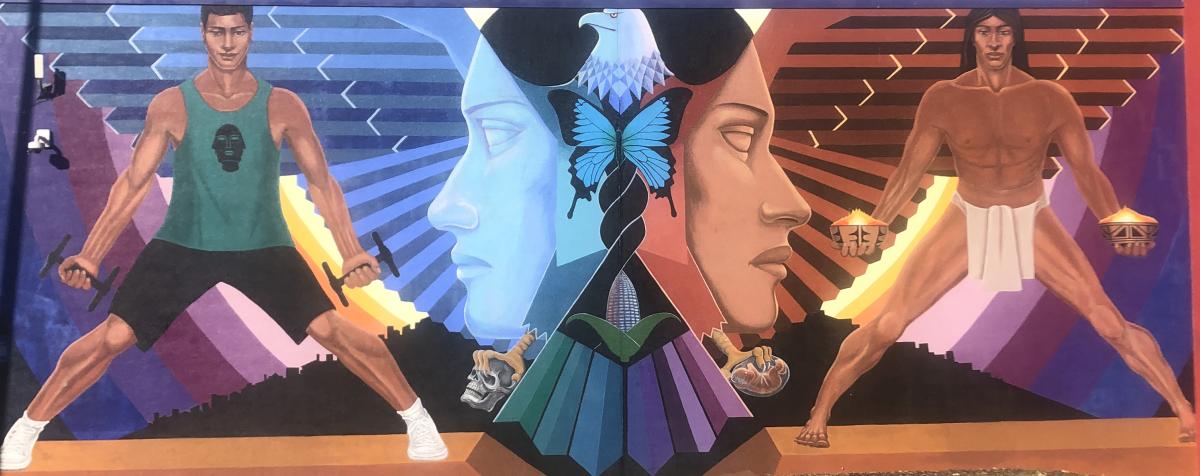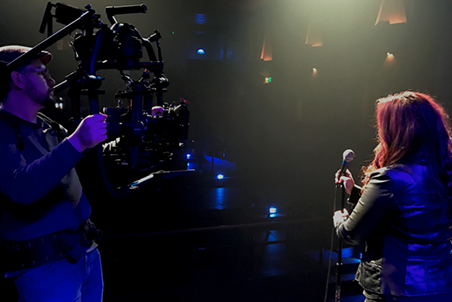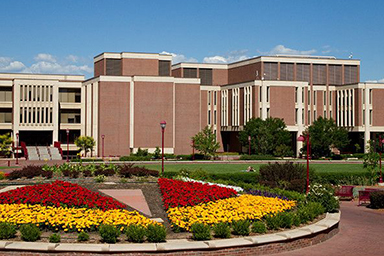Roughly 41 million people in the U.S. speak Spanish. The Spanish Language Media Production mico-credential prepares students to address the issues of linguistic access and equitable representation within media and communication industries. Students will take a combination of courses from the Department of Spanish Language, Literary & Cultural Studies (SLLCS) and the Department of Media, Film & Journalism Studies (MFJS). This collaborative effort is designed to give students a grounding in both Spanish language and multimedia production.
Students will learn about current trends in the development of content strategy, distribution and media production/consumption. They will be able to create content for Latinx communities, media organizations, marking/advertising, bilingual news outlets and independent distribution, while developing professional and critical knowledge about language use in Spanish-speaking and bilingual career-relevant spaces.
(Photo shows "La Alma", a mural by Emanuel Martinez on the La Alma Recreation Center.)
Featured Courses
SPAN 2200
Spanish for Heritage/Bilingual Speakers I
About this Course
Development of the linguistic, literacy and academic language skills of bilingual/heritage speakers of Spanish for preparation to advanced courses and professional settings. Overview of topics relevant to Spanish-speaking communities in the United States. This section is for bilingual/heritage speakers of Spanish only.
MFJS 2240
Multimedia Journalism
About this Course
With the abundance of competing voices online, seeking accurate information has become a major challenge in today’s world. Information now comes in different shades, including incorrect statements, fakes news, rumors, doctored audio, and deepfake videos. They float together in traditional media outlets as well as on social media and they can play a destructive role in creating fear, tarnishing reputations, undermining social cohesion, influencing elections, and, at times, fueling killings. To overcome those challenges, the world needs credible, balanced, and technology savvy journalists as well as critical media consumers more than ever before. MFJS 2240 is a project-based, collaborative, hands-on class that engages with the new media challenges to the field of journalism. The readings, multimedia projects, and class activities aim to empower students to grasp the basic principles, key terms, media production skills, and the organizing structures of digital journalism. Prerequisite: MFJS 2140.
SPAN 3997
Internship in Spanish
About this Course
This course serves as curricular, intellectual, and professional support to a 10-week Spanish internship. Students will be matched to an internship with a community partner (private or public agency, institutional office, non-profit or community organizer) whose mission aligns with students’ professional aspirations in a variety of disciplines. Through the exploration of notions in critical service-learning, students will be given the opportunity to reflect upon their own positionality and its implications for issues in social justice, equity and linguistic diversity as they participate in an internship site. Students are expected to mobilize their linguistic skills in Spanish as part of the experience, and especially as part of their role in supporting community partners explore and understand better ways to serve Spanish-speaking communities across the Denver Metro area. Students will engage with readings, workshops, reflections and a portfolio that showcases their community-engaged work while furthering an understanding of the sociolinguistic implications of Spanish as a U.S. language which is spoken and used in a variety of communities across Denver. An end-of-term showcase will be expected as part of participation in this course. Prerequisite: SPAN 2200, SPAN 2250, or SPAN 2400.




